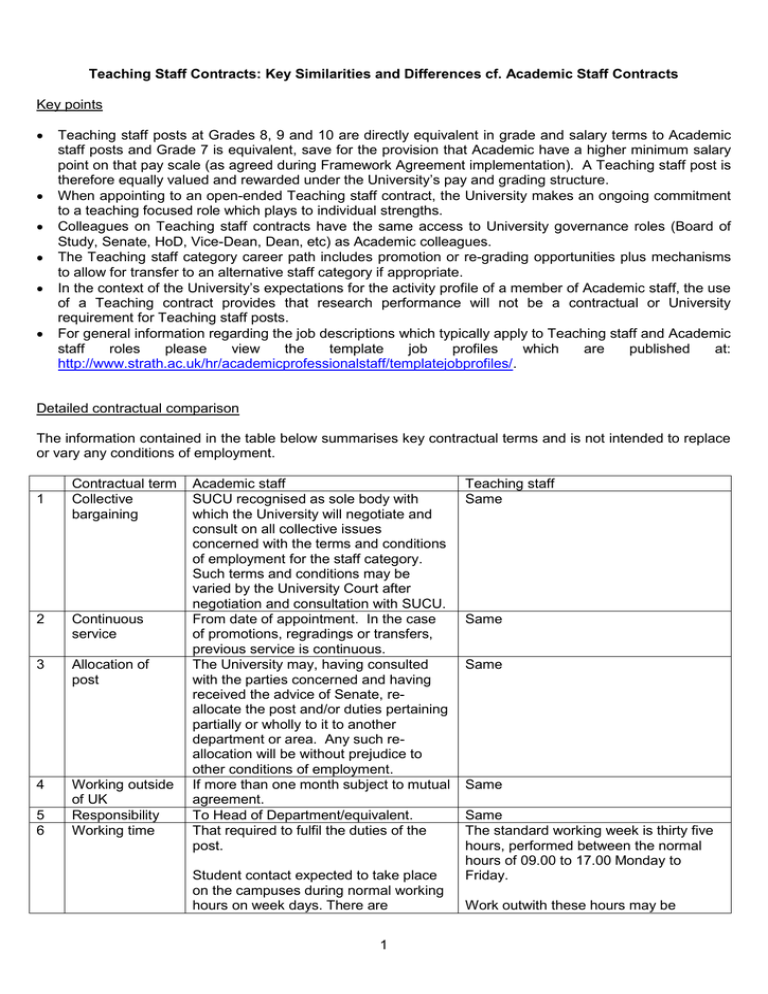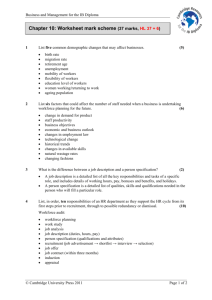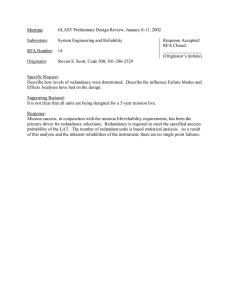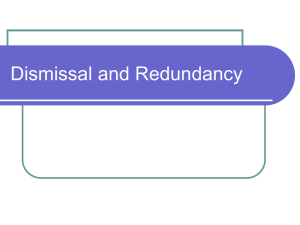Teaching Staff Contracts: Key Differences from Academic Staff
advertisement

Teaching Staff Contracts: Key Similarities and Differences cf. Academic Staff Contracts Key points Teaching staff posts at Grades 8, 9 and 10 are directly equivalent in grade and salary terms to Academic staff posts and Grade 7 is equivalent, save for the provision that Academic have a higher minimum salary point on that pay scale (as agreed during Framework Agreement implementation). A Teaching staff post is therefore equally valued and rewarded under the University’s pay and grading structure. When appointing to an open-ended Teaching staff contract, the University makes an ongoing commitment to a teaching focused role which plays to individual strengths. Colleagues on Teaching staff contracts have the same access to University governance roles (Board of Study, Senate, HoD, Vice-Dean, Dean, etc) as Academic colleagues. The Teaching staff category career path includes promotion or re-grading opportunities plus mechanisms to allow for transfer to an alternative staff category if appropriate. In the context of the University’s expectations for the activity profile of a member of Academic staff, the use of a Teaching contract provides that research performance will not be a contractual or University requirement for Teaching staff posts. For general information regarding the job descriptions which typically apply to Teaching staff and Academic staff roles please view the template job profiles which are published at: http://www.strath.ac.uk/hr/academicprofessionalstaff/templatejobprofiles/. Detailed contractual comparison The information contained in the table below summarises key contractual terms and is not intended to replace or vary any conditions of employment. 1 Contractual term Collective bargaining 2 Continuous service 3 Allocation of post 4 Working outside of UK Responsibility Working time 5 6 Academic staff SUCU recognised as sole body with which the University will negotiate and consult on all collective issues concerned with the terms and conditions of employment for the staff category. Such terms and conditions may be varied by the University Court after negotiation and consultation with SUCU. From date of appointment. In the case of promotions, regradings or transfers, previous service is continuous. The University may, having consulted with the parties concerned and having received the advice of Senate, reallocate the post and/or duties pertaining partially or wholly to it to another department or area. Any such reallocation will be without prejudice to other conditions of employment. If more than one month subject to mutual agreement. To Head of Department/equivalent. That required to fulfil the duties of the post. Student contact expected to take place on the campuses during normal working hours on week days. There are 1 Teaching staff Same Same Same Same Same The standard working week is thirty five hours, performed between the normal hours of 09.00 to 17.00 Monday to Friday. Work outwith these hours may be 7 Holidays 8 Consultancy activities 9 Sick leave/pay 10 Pension 11 Probationary period 12 Place of residence 13 Notice period 14 Disciplinary / redundancy / grievance procedures exceptions to this pattern which may involve student contact at other locations or in the evenings, or at the weekends, but these arrangements will be made with the agreement of the member of staff concerned and may involve additional payment. 31 days annual leave plus eleven public holidays. Leave year October to September. Present arrangements confirm that, for professional development purposes, staff are encouraged to undertake further activities of their own choice in the field for which they are appointed, subject to maximum of twenty-five normal working days in total per University financial year (i.e. during the period 1 August to 31 July inclusive). Such further activities require to be registered and authorised in terms of the University's regulations, the details of which are set out in the staff handbook. Maximum of 6 months full pay and 6 months half pay (entitlement increases with each year of service with maximum entitlement reached after 5 years’ service). Eligible for membership of Universities Superannuation Scheme. Up to three years in first instance. Expected to reside in a location which is compatible with the satisfactory fulfilment of all the duties associated with appointment and with membership of the academic community. At least three months on either side, subject to normal termination dates of 31 March, 30 June, 31 December. Shorter notice by agreement only. As per Ordinance 4.3 (formerly Statute XXIII) and Ordinance 7 (formerly Ordinance 17), published within the University Calendar Part 1 (see note 1). 2 necessary for which no additional payment will be made. Where a Head of Department/equivalent requests additional work to meet the particular requirements of the Department time off in lieu will be granted. Same The Teaching staff contract terms and conditions do not expressly make provision for how consultancy activity would be dealt. It is, however, at the discretion of Heads of Department/equivalent to agree with individual members of staff, regardless of staff category, arrangements for their engagement in external activities which are valuable from a professional development perspective and which are consistent with the interests of the Department and wider University. It is therefore envisaged that consultancy activity which was agreed to be mutually beneficial would be encouraged and supported. Same Same Same, although note that practice is to use shorter probationary period of <1 year and that unlike Academic staff no progression from Grade 7 to Grade 8 through the annual review process and subject to satisfactory performance. Same At least three months on either side. Shorter notice be agreement only. As per “ALC and Other Related” staff handbook (see note 2). Currently, the two key differences are: Redundancy scenarios: for Academic staff both the decision to remove a post from the University’s staffing establishment and the subsequent selection of a staff member for redundancy dismissal require Court approval on the recommendation of a Redundancy Committee; for Teaching staff the decision to remove a post from the University’s staffing establishment requires Court approval and the subsequent selection of a staff member for redundancy dismissal is delegated to a Redundancy Committee/Officer appointed by Court. The hearing of an appeal against a decision to dismiss a member of staff: for Academic staff, appeals against dismissal are considered by a lawyer of at least ten years’ standing; for Teaching staff, appeals against dismissal are considered by a lay member of Court who has not been involved in the decision to dismiss. Notes 1. http://www.strath.ac.uk/corporateservices/gmpt/academicaffairs/publications/ 2. http://www.strath.ac.uk/media/ps/humanresources/Discipline_Dimissal_and_Removal_From_Office.pdf FB 28/11/10 3



